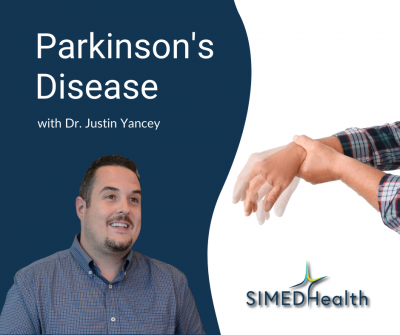
Neurologist Dr. Justin Yancey, discusses the symptoms and treatment options for Parkinson's disease.
Parkinson's disease is a progressive nervous system disorder affecting movement. It is caused by the loss of brain cells that produce dopamine, a neurotransmitter which helps control our movements. The cause of Parkinson's disease is unknown, but it is thought to be due to a combination of genetic and environmental factors. There is no cure for Parkinson's disease, but there are treatments to help manage the symptoms, including medication, surgery, and physical therapy.
The symptoms of Parkinson's disease typically begin gradually and slowly worsen over time.
These symptoms can include:
* Tremors: shaking movements typically starting in the hands and fingers, and can spread to the arms, legs, head, and voice.
* Slowness of movement: increased difficulty walking, talking, and performing other tasks.
* Stiffness: increased difficulty moving the arms and legs.
* Difficulty with balance and coordination: increased fall risk when standing or walking.
* Problems with speech: increased difficulty speaking clearly or quickly.
* Swallowing problems: increased difficulty swallowing food and liquids, and creates risk of aspirating into the lungs.
* Sleep problems: increases difficulty falling or staying asleep.
The treatments that can help manage Parkinson’s symptoms include:
* Medication: reduces tremors, slowness of movement, and stiffness.
* Surgery: implants a device delivering electrical stimulation to the brain which helps reduce tremors and improve smoothness of movement.
* Physical therapy: improves balance, coordination, and flexibility.
* Occupational therapy: improves activities of daily living, such as dressing, bathing, and eating.
* Speech therapy: improves speech and swallowing functions.
Parkinson's disease can have a significant impact on a person's and their family’s lives over time. However, there are many resources available to help people with Parkinson's disease and their caretakers. These resources include:
* Support groups: provide a place to connect with others who understand what they are going through.
* Online resources: many are available, such as the National Parkinson’s Foundation (NPF) and the Michael J. Fox Foundation.
* Medical professionals: can provide information and support.
If you are living with Parkinson's disease, it is important to remember that you are not alone. There are many resources available to help you live a full and active life. To learn more about Dr. Yancey, click here. To schedule an appointment with Dr. Yancey, click here.